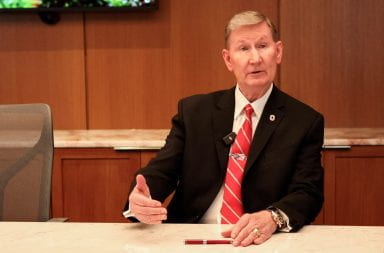Fifteen minutes ago I was contemplating an all-nighter. My compulsive and impractical need for fact-based decisions led me to a recent The New York Times Magazine article that shared the results of a recent study on the effects of sleep-deprivation. After having perused through the article, I’m inclined to believe I can ill-afford my planned rendezvous with my econ textbook.
The study, conducted by David Dinges, the chief of the division of sleep and chronobiology at the University of Pennsylvania and Hans Van Dongen, a researcher on sleep and performance at Washington State University, measured sustained attention for three groups of sleepers for a period of two weeks. The misfortunate group was allotted only four hours of sleep a day, another group six hours, and the last, cosmically blessed, group slumbered for eight hours every day.
The researchers used Dinges’ Psychomotor Vigilance Test (PVT) that measures response time of the subject made to click the space bar whenever a series of numbers randomly appears on the computer screen. The longer it took them to click, the worse their attention performance score.
It’s not hard to predict that those most revitalized from their prolonged beauty sleep outperformed the other groups. However, what is noteworthy is the deteriorating underperformance of the other two groups. By the end of the two weeks, the extent of impairment for the four-hour group was amounted to the same level of impairment of a person continuously deprived of sleep for 88 hours. The article noted that another Dinges’ study claimed 24 hours without sleep is equivalent to being legally drunk.
A simple Google search for the PVT allowed me to test this out on myself. Admittedly, my little shut-eye last night would have placed me in the miserable four-hour group, but I felt surprisingly alert thus thinking I would fare well. My deluded self-confidence should have forebode my results.
After happily clicking the mouse as the numbers intermittently appeared on my screen, I frowned at my results, “fatigue has obviously set in and you need to wake up sleepy head.” Displeased, I resolved to do another online PVT. These results were even more wince inducing, “your results show that your alertness may be suboptimal. Consider medical evaluation.”
Apparently, I’m tired. Sufficient sleep is the sine qua non of the next day’s proper mental and physical functioning. The general collegiate tendency as exams loom nearer and work commitments stack up is to eschew healthy habits. Our beds are the first to be abandoned. Instead, we obsequiously surrender to our desks, our books and our computers. Health, it seems, is not a thing of convenience. But according to the study, the marginal utility of each hour of work favored over sleep diminishes much more rapidly than previously thought. The old adage that dictates eight hours of sleep a day as essential, which has been so routinely hammered into my head by my mother, now has further support.
Students droop and stumble out of the libraries during the wee hours having achieved only minimal efficiency. At this most unfruitful night hour, students should swap the books for the bed — on occasion, it’s okay to get a luxuriously serene eight, nine or even ten hours of sleep. And for my compatriots who daily insist on taking advantage of Thompson Library’s extended hours, I wish you the best in your laborious studies. Tonight, thankfully, I’ll be sleeping.


